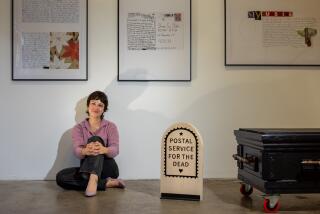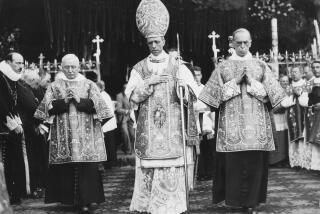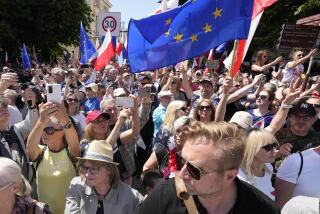A tricky bid for history
- Share via
WARSAW — Within minutes of seeing the delicate letters and postcards at the German auction house, museum curator Joanna Lang began frantically sending text messages to her bosses in Poland. She was looking at the single largest cache of mail to emerge from the Warsaw Uprising, the doomed insurgency by Poles against Nazi occupiers in 1944.
Rare and in some cases hand-drawn stamps were firmly pasted on envelopes. Faded hellos were nevertheless clear and poignant in their brevity. Postmarks were legible, and some bore the uneven edges of the handmade postmarks stamped by volunteers in the effort to run an unlikely -- even heroic -- postal service in the middle of a war.
“When I saw it with my own eyes, I knew we had to have it,” Lang said. The collection “is very beautiful, very unusual, and every letter had an authentic paper.”
Whispers about the 150 letters, postcards and envelopes, up for auction in Duesseldorf, Germany, first circulated in Poland in late January. Lang and stamp experts rushed to examine the collection, held by a German owner, just hours before it was set for auction Feb. 9.
The letters were viewed as evidence of a telling facet of the Warsaw revolt. The rebellion-against-all-odds energized all of society in 1944. The postal service sprang to life as the work of a corps of young Polish scouts who dared to deliver mail to families trapped or splintered by battle.
Run by teenagers and the Home Army resistance, the postal service was responsible for delivering 150,000 pieces of mail in two months’ time.
The Warsaw Uprising was a broad rebellion against Nazi German occupiers that was spearheaded by the Polish Home Army. (Not to be confused with the Warsaw Ghetto Uprising, a monthlong heroic effort by Jews in 1943 that was vanquished by the Germans.)
The rising of 1944 was expected to last only a few days, until Soviet troops arrived, but it went on for 63 days before the Germans crushed it. The Soviets never advanced into Warsaw to fight the Germans. At the end, the city was a wasteland of graves and rubble.
Jerzy Kasprzak, a patron of the museum who was a 14-year-old scout in 1944, understood the emotional and historical value of the newly found letters. Of all the mail sent during the war, only about 1,000 pieces are estimated to have survived. The museum had about 100 pieces already; this acquisition would more than double its trove. Kasprzak, 79, helped Lang judge the collection by viewing it, from afar, via a computer scan in Warsaw.
“It was very emotional,” said Kasprzak, white-haired and brimming with memories. “You have to remember what it was like. During the uprising, after two or three days, it turns out people were not so concerned about food or other needs. They wanted to know: Is my son or daughter OK? And that’s what those letters meant.”
Owner Manfred Schultze had acquired the letters, piece by piece, over some years. When the Poles saw his cache -- and quickly were in contact with Poland’s Ministry of Culture and National Heritage about the find -- they first tried to persuade the German auction house and Schultze to simply sell them the documents.
But the collector was determined to go to auction, and he wanted no less than 190,000 euros, or $280,000 at the time, for the historic lot. The historians from Warsaw realized they had no choice.
The Poles launched a modern-day battle for the letters of the Warsaw Uprising.
Only since the fall of communism has Poland’s last-ditch fight against the Nazis been fully explored. The Warsaw Uprising Museum, which opened in 2004 as a multimedia center in the heart of the capital, has added enormously to the study and understanding of the rebellion.
Before leaving to view the letters in Germany, museum officials alerted Polish media to the documents’ existence. A campaign sprang from the media. Museum authorities also sought financial help, and they were rewarded with cash from two business stalwarts, PKO Bank Polski and Poland’s biggest phone company, known as TPSA.
In Duesseldorf, the museum team began parrying with auctioneer Ulrich Felzmann during the night of Feb. 8. It verbally offered the opening bid as a purchase price. That offer was rejected. Then Polish and German authorities tried to bring pressure to bear. The Ministry of Culture and National Heritage in Warsaw pleaded in a letter to Felzmann that the auction be called off. The German Ministry of Culture faxed a letter in support of the Warsaw appeal.
Those entreaties failed too.
Then sometime around 2 a.m. on Feb. 9 -- the day of the auction -- the museum submitted a written proposal for the owner and the auction house to abandon the auction. The bid would be paid outright, the museum promised.
The auction house tentatively agreed; the owner again refused.
At 2:40 a.m. -- and by this time the Poles were keeping minute-by-minute records of their high-stakes race -- auctioneer Felzmann had an epiphany.
He could not, according to his contract with the owner, change the actual terms of the auction. But Felzmann told the museum team that he had the power to change the time of the bidding.
The letters were set to be sold at an afternoon session, beginning at 12:30 p.m. Felzmann told curator Lang to find a seat when the morning session began at 10 a.m.
Wasn’t Felzmann really aiming to do the Poles a grand favor?
“No comment,” Doerrenbach said. “But perhaps this helps you: This is the first time in 32 years -- in the history of the auction house -- that the course of auction was changed. . . . And I will say this: We were very satisfied that the items went to the place, and people, where they originated.”
So sometime just before the morning session of the auction ended, Felzmann made a short and unusual announcement. The letters of the Warsaw Uprising were now up for bid.
At 11:08 a.m., Lang raised her bid number -- No. 46 -- slightly. Hers was the opening offer of 190,000 euros.
The young historian later said she held her breath, knowing that any subsequent bids would raise the price of the letters by increments of 10,000 euros. But there was silence. And silence. And then three hard whacks of a hammer.
The museum had won the battle of the Warsaw Uprising letters.
Aug. 8, 1944
To: Mrs. Magdalena Klos, Poznanska 4
Dear Madam. I’ve been to your flat and it’s closed. The windows are broken and they are covered with wood. The neighbors tell me nothing is missing. If I know something more, I will write to you. I have no place to stay.
Marek Zasun from Czerniakowska Street
Sept. 1, 1944
To: Stanislaw Madej, Koszykowa
Marek. The home is OK. The building of our parents has burned down. We are in good health. And we are awaiting your return. Father.
Madej, Dobra 10
All letters acquired in Duesseldorf went on display March 18 at the Warsaw museum.
More to Read
Sign up for The Wild
We’ll help you find the best places to hike, bike and run, as well as the perfect silent spots for meditation and yoga.
You may occasionally receive promotional content from the Los Angeles Times.






